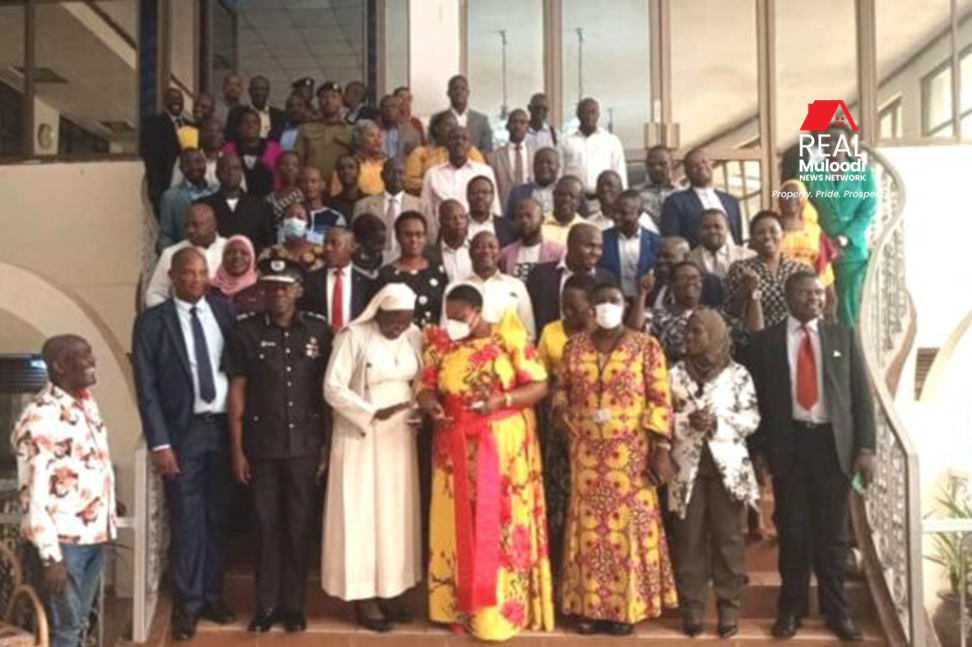UGANDA, Mukono | Real Muloodi News | Minister for Presidency, Hon. Babirye Milly Babalanda has reminded Resident District Commissioners (RDCs), Resident City Commissioners (RCCs), and their deputies that the Presidential Directive of February 28th, 2022, that prohibits illegal land evictions across the country still stands.
She was speaking during the opening of the Central Buganda Regional RDC/RCC and Deputies capacity building workshop at Colline Hotel, Mukono.
“Overtime, despite the National Resistance Movement (NRM) Government’s program to streamline land management systems in the country, there have been many cases of illegal evictions, or lawful evictions carried out wrongly. In each of these cases, acts of violence, social instability and bloodshed have occurred. In some cases, entire villages have been affected,” she said.
She emphasised that such evictions are irrational and increase inequality, worsening the economic bearing of vulnerable and marginalised sectors of society, especially the elderly, women and children.
The Minister stressed that before carrying out any evictions, all feasible alternatives must be explored in consultation with the affected persons.
Adequate and reasonable notice must be given to all affected persons before the scheduled date of eviction, with the provision of legal remedies to seek redress in case they are dissatisfied, and due compensation.
In her speech, Hon. Babalanda pointed out that despite the National Resistance Movement’s (NRM) program to streamline land management systems in the country, there have been many cases of illegal evictions or lawful evictions carried out wrongly.
In each of these cases, acts of violence, social instability, and bloodshed have occurred. She commended some of the RDCs/RCCs and their deputies who have been active on the radio mobilising the public on government policies and urged them to participate in community sensitisation meetings to update the public on government policies.
The Minister highlighted that the RDCs/RCCs and their deputies are responsible for overseeing the implementation of government policies as the official representatives of the central government in their respective districts and cities.
“There are those of you who are permanent panelists and soon I shall issue a list naming the most active of you. However, I appeal to you to as well participate in community sensitization meetings to update the public on government policies. For you in Central Uganda you are lucky that you have several points with already made crowds that you can address routinely,” Hon. Babalanda noted.
She reminded them that as change agents, they must have all the skills to monitor and engage Ugandans in all government programs.
Hajj Yunus Kakande, the Secretary-Office of the President, reminded the commissioners of their roles as representatives of the President in their respective areas of jurisdiction. He urged them to observe the four core principles of the NRM, which include patriotism, Pan-Africanism, democracy, and socio-economic transformation, to push the government’s development agenda.
“Help the government to deal with those wrangles,” Hajj Kakande advised.
He also emphasised that the commissioners should strictly follow the Presidential directive on land evictions and wetland conservation.
Hon. Babalanda also raised concern over the issue of Allied Democratic Forces (ADF) rebels in central Uganda, saying that it is real and becoming a big problem.
She advised the commissioners to coordinate with hotel owners, guest houses, entertainment centres, and transporters, and remind the LC 1 chairpersons to be on the lookout to screen the people in their villages.
She thanked H.E. the President for intervening on behalf of Ugandans to protect the rights of citizens, no matter their status, and to prevent a breach of peace and bloodshed.
The President’s intervention is intended to benefit citizens who were previously voiceless and helpless.
“President Museveni’s intervention on behalf of Ugandans is intended to protect the rights of citizens no matter their status and, above all, to prevent breach of peace and bloodshed.It’s not enough to have money and acquire a property; one has to undertake due diligence to ensure that the property has no squatters or contestation of any nature. Generally, evictions should only be carried out in exceptional circumstances, and in full accordance with relevant laws,” Hon. Babalanda told the commissioners.
“Prior to carrying out any evictions, all feasible alternatives must be explored in consultation with the affected persons; adequate and reasonable notice must be given to all affected persons prior to the scheduled date of eviction, with the provision of legal remedies to seek redress in case they are dissatisfied and due compensation.”
READ MORE LIKE THIS:
Nabakooba Guides RDCs on Museveni Directive Halting Illegal Land Evictions
“No One Will Evict You”— Minister Nabakooba Comforts Mbarara Tenants on Government Land
Museveni Bans Land Evictions Countrywide, Warns Judicial Officers



